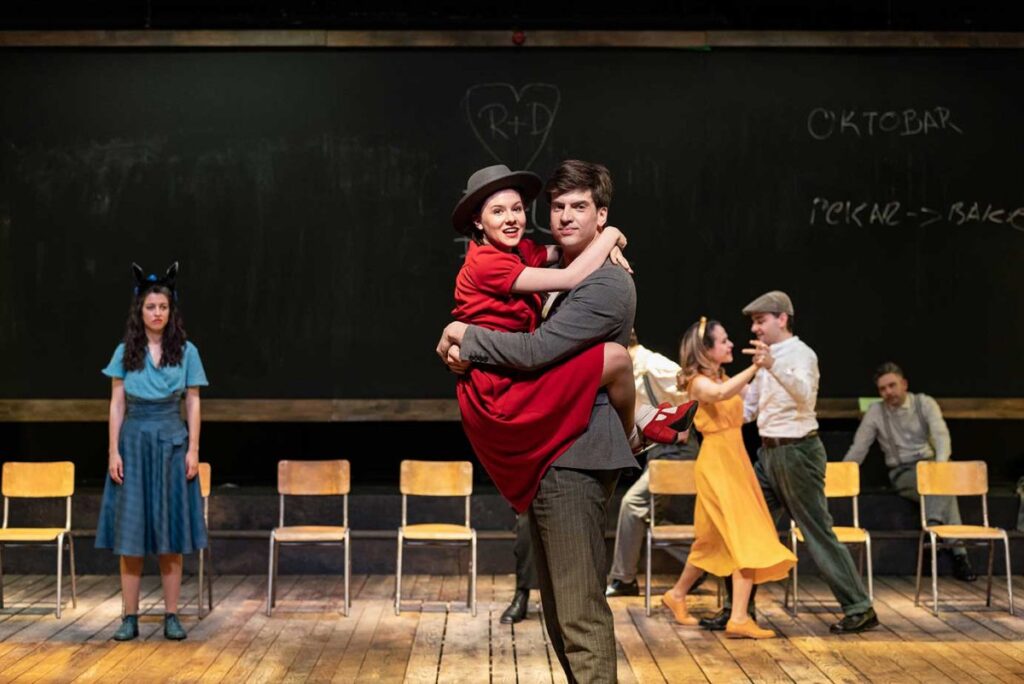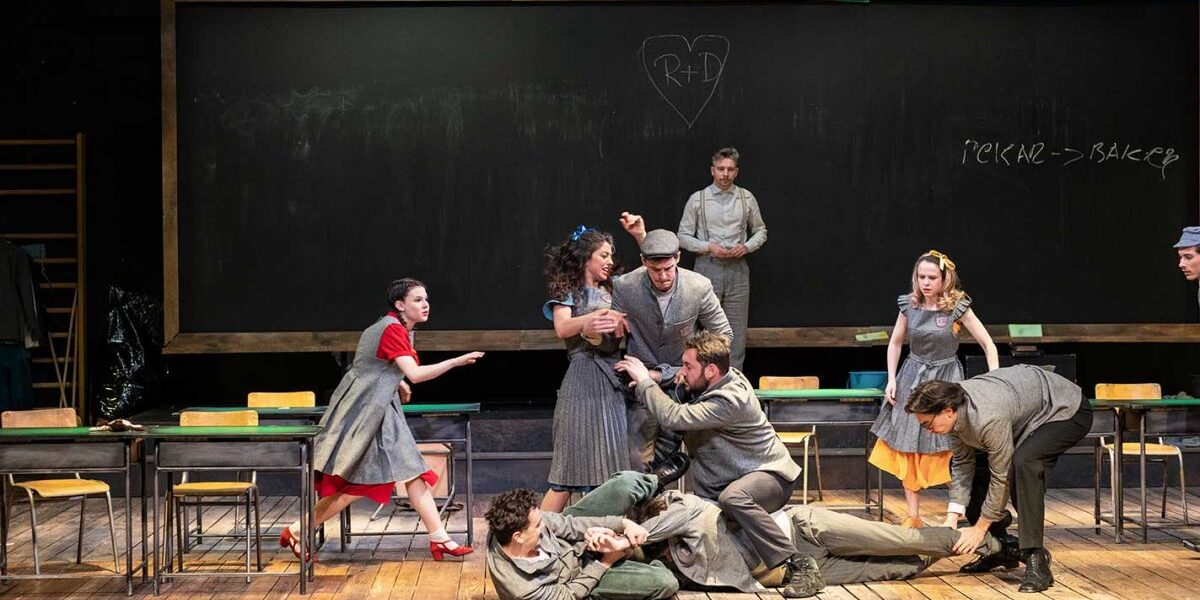National Theatre Belgrade, premiere 9th April 2023
“It takes no more than a good man doing nothing, for the evil to win.”
Written in 2009, Polish playwright Tadeusz Słobodzianek‘s Our Class follows the lives of ten Jewish and Catholic high school classmates in Poland, whose coming of age is brutally impacted by the communist and Nazi regimes in the region.
The play was inspired by the 1941 massacre of Jews in Jedwabne, with Słobodzianek adding his own fictive events to the play. We first meet the characters as teenagers and watch them become the worst kinds of people – torturers and victims, rapists and telltales on the the same people with whom they used to share the classroom.
The aspect of this story hits harder today than it did when Tatjana Mandić Rigonat‘s production had its premiere in Belgrade in April: less than a month later, on the 3rd May 2023, the tragic „Vladislav Ribnikar“ elementary school shooting took place in the city. Watching this performance for the second time during the Borini Dani Theatre Festival in Vranje, it felt even more impactful, especially given current events, and the situation with the Israeli-Palestinian wars, where the once oppressed group becomes the oppressor.
Having obvious grown-ups cast as teenagers is always slightly bizzare, however in Our Class this approach is necessary since we follow the lives of the characters until their end. The actors subtly build their characters from the freshness of youth to worn-out old age (or even worn-out youth). All the performances are brilliant in different ways: Dora (Jelena Blagojević) as a star whose light was brutally put out, way too early; Zigmunt (Petar Strugar) as the worst kind of hypocrite; Rahelka (Suzana Lukić) and Menahem (Jovan Jovanović) as those who found the easier way out compared to their brethren, the consequence of which was an utter lack of will to keep on living; Vladek (Nedim Nezirović) the antihero; Zoha (Nina Nešković), a quiet flame of a woman surviving in inhumane conditions; Henjek (Danilo Lončarević), an ambivalent slimebag; Jakub (Dragan Sekulić) and Rišek (Vučić Perović) as two different representations of a healthy, youtful revolt which needed to be sacrificed; and finally Abram (Dušan Matejić) as a distant observer, seemingly outside of the story, but in reality a main representative of the innability to do anything to stop the tragedy.
The sheer number of characters and different stories in the same circumstances of Our Class evokes a universal human tragedy where everybody loses something: morality, humanity, family, hope, faith, life, all the things that make a human being a person.
While the plot of Our Class is made up of many storylines, the semi-prosaic style of narration is skilfully crafted and creates a balance within Mandić-Rigonat’s dramatisation. The movement, by Igor Koruga, is also well thought out and works hand in hand with the verbal narration, making sure the audience can follow the story. The depiction of Dora‘s rape and cruel death, as well as Jakub‘s death, are particularly effective because the actors constantly maintain eye contact with the audience, almost as if they are blaming everybody watching.

Our Class, National Theatre Belgrade
The experience of this performance is multi-levelled: even before the start, a sound of birds chirping comes from the stage. The scenography (Branko Hojnik) consists of a blackboard, metal desks, a small water fountain and wooden ladders, with hay added later as a symbol of sacrifice and upcoming tragedy. Those in exile climb the ladders as if they are claiming a ’time out’ from the bloody games on the stage, while still observing everything. The live musicians (Vladimir Gurbaj, Nikola Dragović and Ivan Mirković) are constantly present in the corner of the stage as well. The blackboard serves as a death book where the names of the deceased get written, as well as significant historical events and questions which get no answers, such as Where was God here? The board ’cries’ at the very end, with water washing away everything that was written there.
Mandić Rigonat draws multiple parallels to Serbia and Yugoslavia. While trying to reveal the genocide in his town, Menahem claims that“Nothing can be done in this country, because priests always find the way out“, which is doubly as funny since Menahem‘s character is a double agent for the State Security Administration.
Describing her family‘s downfall, Rahelka explains how her father‘s carefully built mill was taken via nationalisation and destroyed by a man with three grades of elementary school, which was a reason why she started learning German. The choice of musical numbers (picked by Mandić Rigonat and composed by Irena Dragović) additionally underlines the director‘s intention to connect the story with local history. One of the most moving parts is the collective performance of the Sevdah song ‘Kad ja pođoh na Bembašu’, which originated from the Jewish tradition but is also considered an unofficial theme of the city of Sarajevo in Bosnia and Herzegovina. Shortly after this song there is an ethnic crime in Our Class, which could be interpreted as another parallel with Yugoslav history, specifically, the crimes committed in Bosnia during Milošević’s regime.
Many stories about the Second World War have been told, especially those about the massacre of Jews. These are stories we know, however it is important to remember that Our Class is not just a play about the past. The things it speaks about: evil, inhumanity and the toxic power of silence, unfortunately, live as freely as ever before. Watching the news, it seems like we are failing to learn these lessons in humanity over and over again, and therefore they need to be repeated.
Credits:
Direction, adaption, choice of musicTatjana Mandić Rigonat// Scenography Branko Hojnik//Costume Ivana Vasić//Composer Irena Dragović//
Stage movement Igor Koruga//Video work Jelena Tvrdišić
For tickets and further information: Narodnopozoriste.rs
Ana Ogrizović is a Dramaturgy graduate from Serbia, recognised by multiple poetry, prose and playwriting competitions. She is currently pursing a Masters degree and editing her first poetry book.








